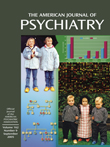To the Editor:
Bishop: I see you have a bad egg.
Curate: Oh, no, my lord, parts of it are excellent.
The report by Steven P. Roose, M.D., and colleagues on the treatment of old-old depressed patients with citalopram
(1) concluded that medication was not more effective than placebo. In this multicenter study, there was a major effect of study site on response and remission rates to both placebo and active drug. Attempting to put the best face on the results, the authors suggested that more severely depressed patients tended to have a higher remission rate with medication. They also underscored the perspective that the placebo condition in such a trial “is not remotely close to a ‘no-treatment’ condition” (p. 2057).
Overall, the trial highlights the present sorry state of research into antidepressant efficacy. A more rigorous view of the data by site suggests that the trial lacked ecological validity. When rates of response and remission are higher for placebo than for active drug at six of nine sites (the authors’ Figure 2), the pooled analysis becomes an exercise in futility. Moreover, the faintly encouraging secondary analyses lacked a sound base in any primary effect, and they were not corrected for multiple comparisons. These concerns are compounded by the multivariate statistical approach, which inflated the practical significance of the secondary analyses.
For instance, in a secondary analysis, the authors reported a significantly higher rate of response (p=0.04) to citalopram versus placebo in the high-severity group (defined by an initial Hamilton Depression Rating Scale score >24). Not only was this “significant” finding not subjected to Bonferroni correction, it did not hold up when the analysis was conducted on the primary outcome data (χ2=3.07, df=1, p<0.08).
Although inflating the trend for citalopram to be more effective in the high-severity group, the authors failed to point out that the low-severity group, in which there was absolutely no suggestion of a drug effect, constituted 61% of the sample. Their data comport with the recent recommendation from the National Institute for Clinical Excellence in Britain that “antidepressants should not be used for the initial treatment of mild depression because the risk-benefit ratio is poor”
(2).
As to the authors’ anodyne discussion of the perspective that placebo treatment in a clinical trial amounts to far more than no treatment, the point is so well known that it does not bear tedious repetition and elaboration. It is also irrelevant to the primary objective of the study, which was to determine whether the use of citalopram is associated with added therapeutic value beyond what can be achieved by the attentive clinical interest provided to all patients.

